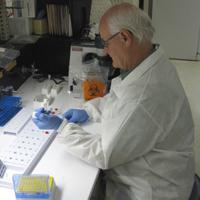Blood test for hCG. Why is it needed?
Today, the blood test for HCG is increasingly performed,since it helps to establish the fact of pregnancy, to control its development, and also to diagnose some tumors. After implantation of the embryo, this hormone is produced by chorion, but it can produce neoplasms.
Actively applied today pregnancy testjust reveals in the urine of hCG. But the blood test is more accurate and confirms it several days earlier. In addition, the level of the hormone should have certain values in different weeks of pregnancy. If it does not correspond to the norm, then it is possible to suspect various pathologies.
Also, when several fruits are hatched, the concentration of hCG increases. If the embryo does not develop in the uterus, then usually less hormone is produced. This is the case with tubal pregnancy.
So, when donating blood to HCG:
- detection and control of treatment of testicular and ovarian cancer;
- Diagnosis of fetal and pregnancy pathologies;
- exclusion of the embryo outside the uterus;
- check the completeness of abortion;
- confirmation of the fact of pregnancy.
Analysis must be taken in the morning, on an empty stomach. The doctor needs to be warned about the medications being taken. To establish the fact of pregnancy, the test for hCG is desirable to pass no earlier than four days after the delay. In different women, the hormone begins to be synthesized at different times after implantation, in some it can be detected within a day.
The analysis of blood on hCG enters into prenatalscreening. This study helps to identify women at risk of having a child with chromosomal abnormalities. However, it should be understood that the high probability obtained by screening is not a verdict, but only an indication for an in-depth examination.
So, hCG is increased in the following cases:
- receiving gestagens;
- malformations and pathologies of the fetus;
- incorrectly defined deadline;
- diabetes mellitus in women;
- multiple fertility;
- toxicosis;
- after abortion;
- chorionicancinoma;
- hCG administration;
- neoplasms of the kidneys, uterus, lungs;
- bladder skidding;
- a tumor of the intestine or testicles.
Low concentration of a hormone happens at:
- pregnancy overstretch;
- delay in the development of the baby;
- death of the fetus;
- threat of miscarriage;
- placental insufficiency;
- undeveloped or ectopic pregnancy.
So, a blood test for the HCG norm in mU / ml:
- 1-2 weeks - 28-303;
- 2-3 week - 1503-5003;
- 3-4 weeks - 10003-30003;
- 4-5 week - 20003-100003;
- 5-6 week - 50003-200003;
- 6-7 weeks - 50003-200003;
- 7-8 weeks - 20003-200003;
- 8-9 week - 20003-100003;
- 9-10 week - 20003-95003;
- 11-12 week - 20003-90003;
- 13-14 week - 15003-60003;
- 15-25 week - 10003-35003;
- 26-37 week - 10003-60003;
- women who do not bear a child, and men - up to 8.
The hormone affects the development of the fetus and is needed forpreservation of pregnancy. Its level doubles every two days with its normal flow in the first weeks. During this period, determining the amount of hCG allows you to judge the health of the fetus and the course of pregnancy. It is he who provides in 1 trimester the production of the necessary hormones. In particular, hCG prolongs the functioning of the yellow body, which synthesizes progesterone.
The weeks are counted from the day of the last menstruation. The concentration reaches a maximum at about 15 weeks, and then decreases. After birth in the blood, the hormone is not found.
With prenatal screening in the first trimester is givenHCG and PAPP, and in 2 - ACE, hCG and estriol. When determining the risk of having a baby with a chromosomal pathology, other data are taken into account. Among them, the age of a woman, smoking, data from ultrasound, medications taken and much more.
So, a blood test for HCG is performed fordiagnosis of pregnancy, revealing its pathologies, malformations of the fetus, as well as some types of cancer. Any deviation from the norm can be a symptom of a serious pathology and requires the advice of a qualified specialist. Only he can correctly decipher the result of the analysis, appoint an additional examination and effective treatment.












